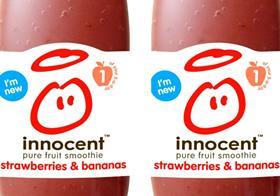
Fruit juices, smoothies and fruit drinks marketed to children and their parents contain “unacceptably high” levels of sugar, often as much in one small carton or bottle as a child should consume in a day, according to research.
The paper - published in the journal BMJ Open - comes in the wake of the chancellor George Osborne’s announcement of a tax on sugary soft drinks.
However, fruit juices and smoothies are exempt from this tax.
The researchers believe tough action is needed to reduce the amount of sugar children consume in fruit drinks that are bought and sold on the assumption that they are healthy.
“These are marketed intensively to children as well as to parents,” said Professor Simon Capewell, one of the authors. “They are routinely packaged in garish colours. They routinely have cartoons and other sort of folksy animal creatures being used to market them.
“There is often a health halo – some claim about vitamin C or ‘packed full of fruit’. There are no restrictions around the words industry can use in their marketing. They can claim or imply quite a lot. Then we end up with more than a third of these drinks having more sugar in them than a cola or fizzy drink.
“I think it came as quite a surprise to us really that there is so much sugar hidden and that any of the most familiar brands had such a high level.”
One in five children aged four to five years and one in three children aged 11 are overweight or obese. Children aged between four and 10 get 30 per cent of their sugar intake from soft drinks. Sugar is also responsible for decaying teeth, which is the most common reason for children in England to be admitted to hospital.
The researchers analysed 203 fruit juices, fruit drinks and smoothies stocked by seven major supermarkets – Tesco, Asda, Sainsbury’s, Marks and Spencer, Waitrose, The Co-op and Morrisons. They found almost half contained a child’s entire recommended daily intake of sugar, which is a maximum of 19g or nearly five teaspoons.
They looked for added sugar or naturally occurring sugars in the juices and smoothies. The average sugar content was 7g per 100ml, but in fruit juices and smoothies, it was significantly higher. Among the 21 fruit juices analysed, it averaged 10.7 per 100ml and among the 24 smoothies, it averaged 13g per 100ml.
Almost 60 per cent of the drinks would get a red traffic light label on the basis of their sugar content, the paper says.
Eating fruit does not pose the same problems as drinking the juice, the authors of the paper argue: “One key difference between whole fruit and juice is fibre content,” they write. “Whole fruit slows down consumption and has a satiating effect. Research shows the body metabolises fruit juice in a different way compared to whole fruit.”
The researchers recommend that fruit juices, fruit drinks and smoothies with high sugar content should not count as one of the consumers' recommended 5 A DAY intake.



